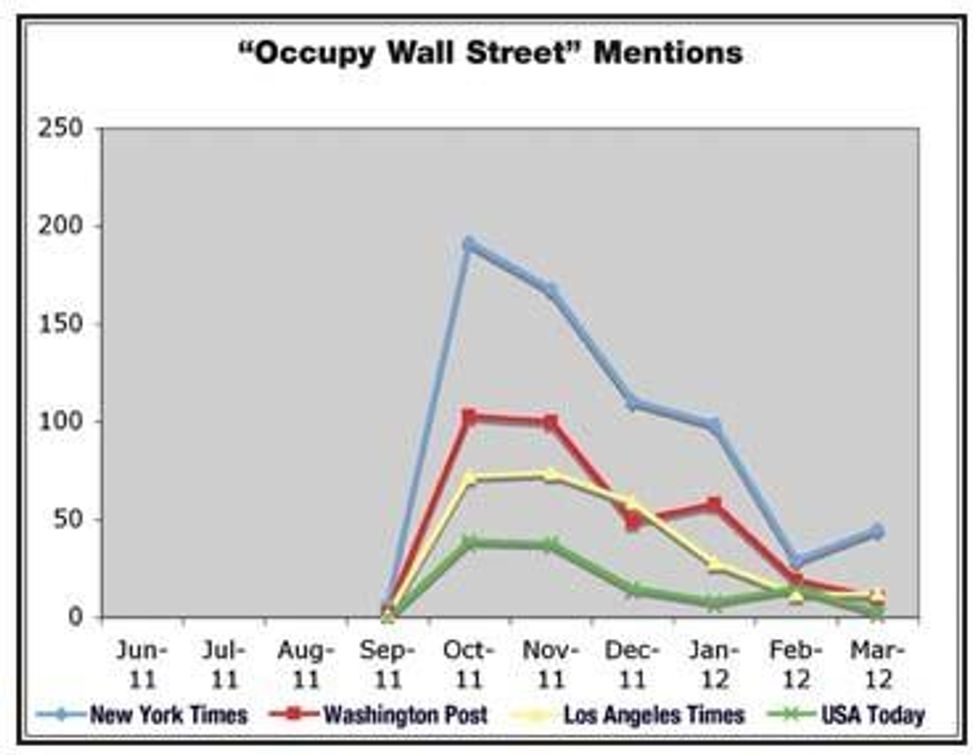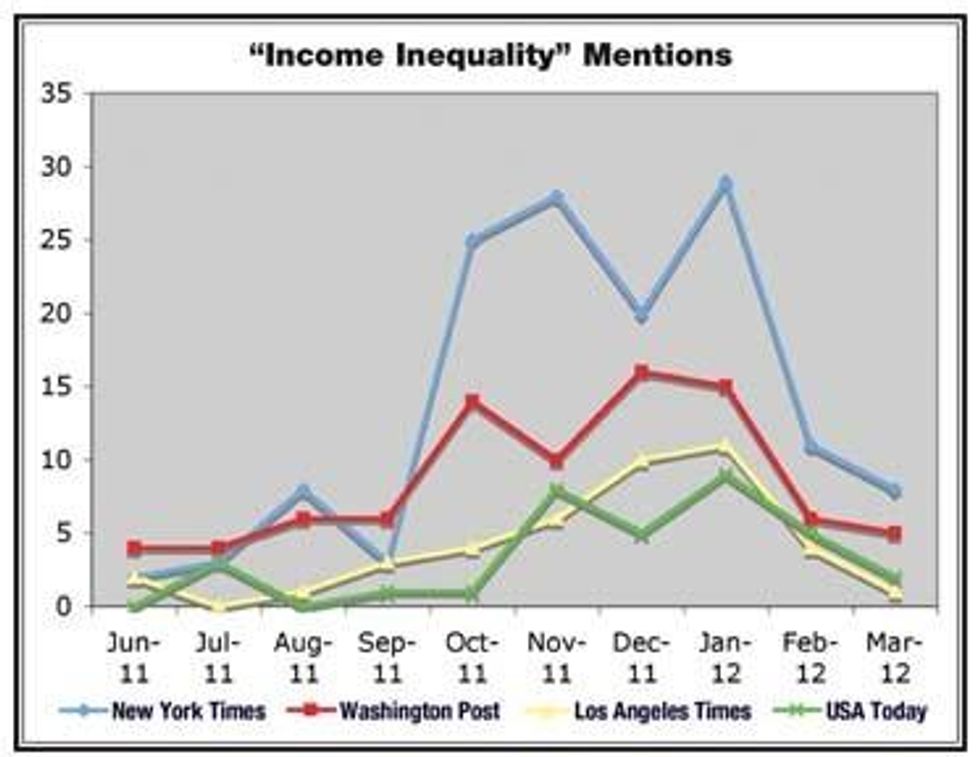Occupy Wall Street is rightly credited with helping to shift the economic debate in America from a fixation on deficits to issues of income inequality, corporate greed and the centralization of wealth among the richest 1 percent. The movement has chalked up other victories as well, from altering New York Gov. Andrew Cuomo's tax plan (New York Times, 12/5/11) to re-energizing activists and unions, but bringing some discussion of class into the mainstream dialogue has been one of its crowning achievements.
As Occupy slowed down for the winter, though, would corporate media continue to talk about our increasingly stratified society without a vibrant protest movement forcing their hand? The answer, unsurprisingly, is no.
As mentions of "Occupy Wall Street" or "Occupy movement" waned in early 2012, so too have mentions of "income inequality" and, to an even greater extent, "corporate greed." The trend is true for four leading papers (New York Times, Washington Post, USA Today, L.A. Times), news programs on the major networks (ABC, CBS, NBC), cable (MSNBC, CNN, Fox News) and NPR, according to searches of the Nexis news media database. Google Trends data also indicates that from January to March, the phrases "income inequality" and "corporate greed" declined in volume of both news stories and searches.
From June 2011 through March 2012, mentions of the phrase "income inequality" in the four papers first increased dramatically, then decreased slightly more slowly. The number of mentions per month ranged from 8 to 15 between June and September. Then in October, when OWS coverage peaked, "income inequality" mentions increased nearly fourfold to 44, and reached 52 mentions in November. January had a total of 64 mentions, though 13 of those stories focused on President Barack Obama's State of the Union address.
By March, there were only 16 mentions of "income inequality," half from the New York Times--which also far outpaced the other papers in coverage of OWS that month, at 45 mentions to the L.A. Times' 12, the Post's 10 and USA Today's three, due in part to the scores arrested in New York City on the movement's six-month anniversary on March 17.
Network broadcasts followed the same pattern, albeit with significantly lower numbers. From June to September, there was only one mention of income inequality (ABC, 8/10/11). Mentions across ABC, CBS and NBC jumped to seven in October and held fairly steady through January, but returned to zero by February.
Similarly, "income inequality" was barely mentioned on CNN, MSNBC and Fox News in the early months of the study. October saw a dramatic increase on MSNBC and CNN, with 10 and 14 mentions, respectively, while Fox News stayed low at only five mentions. The numbers peaked at 54 total in January--again, partially due to the SOTU--but by March, "income inequality" was mentioned only six times across all three cable news channels, four times on CNN and once each on MSNBC and Fox.
NPR followed the same pattern, with a peak of 18 mentions in October and only one mention each in February and March.
"While it is certainly true that prior to Occupy, there was virtually no discussion of class issues in the mainstream media... it's clear that as Occupy faded from coverage, the media turned away from the persistent issues the movement is trying to highlight.
The spike and subsequent drop-off for "corporate greed" was even more pronounced. After only five total mentions in the four leading papers from June through September, the numbers skyrocketed to 62 mentions in October--again, at the peak of Occupy coverage. The following month, however, "corporate greed" only showed up 19 times. By January, it had completely disappeared from the pages of USA Today and the L.A. Times and made only a meager showing at the New York Times (four mentions) and Washington Post (one).
The broadcast network coverage again mirrored the print coverage. From June to September, "corporate greed" appeared only once. In October, mentions shot up to 35, but as in the newspapers, the drop-off was severe: 11 mentions in November and only one across February and March (ABC, 3/14/12).
NPR and cable data tell the same story. Prior to OWS, "corporate greed" virtually never came up. Then, in October, NPR used the phrase 23 times and CNN used it a remarkable 78 times. The return to business as usual was quick, though, with three mentions on NPR in November, one in December, and none after that. By March, "corporate greed" was mentioned only one time on CNN, and not at all on MSNBC or Fox (where the October peaks were only 11 and five mentions, respectively).
While it is certainly true that prior to Occupy, there was virtually no discussion of class issues in the mainstream media (Extra!,
8/09), it's clear that as Occupy faded from coverage, the media turned away from the persistent issues the movement is trying to highlight.
That's not to say that there have been no important, lasting rhetorical shifts. Occupy's most prominent slogan--"We are the 99 Percent"--and the other side of the equation, "the 1 Percent," have created new ways of talking about centralized wealth in America. Even as media focus turned away from Occupy, the phrase "the 1 Percent" continues to appear in news stories worldwide. Whether it's used to describe recent lottery winners (Washington Post, 3/31/12), consumers of expensive new gadgets (PC Mag,
3/26/12) or beneficiaries of Paul Ryan's recently released budget (Chicago Tribune, 3/26/12), the phrase seems to have staying power: From January to March, 109 articles in the four papers mentioned "the 1 Percent" and "wealth."
The danger, of course, is that "the 1 Percent" simply becomes a buzzword and ceases to have any connection to the way American capitalism produces and reproduces economic and social inequality.
What these data show is that "changing the conversation" isn't a one-time thing. Corporate media and their owners have every incentive to ignore not only protest movements, but also the underlying causes of those protest movements. Hurricane Katrina showed that even the most powerful and dramatic events exposing the inequalities and poverty in this country have had only very short-term impact on media coverage of those issues (Extra!,
7-8/06).
Occupy Wall Street reminded the country of the deep economic divisions running through our society, but it appears the only way to keep the issue in the media discussion is to keep OWS--or some other form of large-scale protest--in the news.



